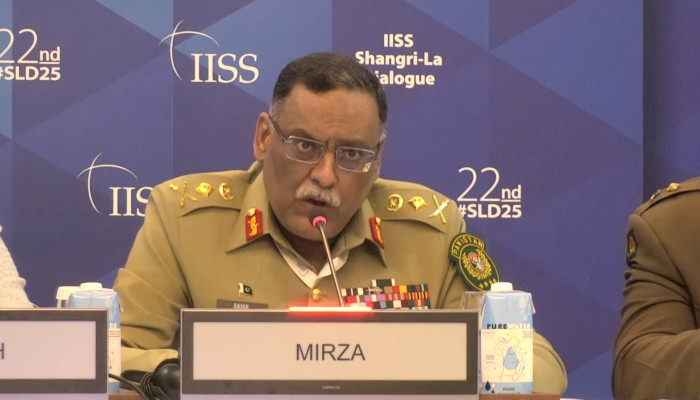CJCSC Stresses Crisis Management, Warns of Conflict Risks
Chairman of the Joint Chiefs of Staff Committee (CJCSC), General Sahir Shamshad Mirza, underscored the critical need for comprehensive and institutionalized crisis management systems across the Asia-Pacific region and beyond. He also cautioned about the increasing dangers of disputes in South Asia.
He articulated these views during a keynote address at the Shangri-La Dialogue held in Singapore.
Gen Mirza asserted that strategic stability should be built on mutual understanding of limitations, fostering trust, and exercising restraint, rather than pursuing dominance or exclusion. He highlighted that inclusive participation is essential for regional security frameworks, noting that these structures cannot thrive without trust or amidst significant power imbalances.
The CJCSC voiced these remarks at the prestigious annual security forum, which gathers defense ministers, top military officials, and security experts worldwide. Representing Pakistan, General Mirza emphasized that power dynamics, communication gaps, and the failure to resolve long-standing disputes are major drivers of escalating security threats in South Asia and the broader Asia-Pacific.
South Asia Concerns
Focusing specifically on South Asia, Gen Mirza drew attention to the region’s looming global-scale threat, citing the unresolved Kashmir issue, worsening relations between India, Pakistan, and China, and the continuing instability in Afghanistan.
He cautioned that nuclear capabilities elevate the risk of strategic miscalculations, stressing that reliable communication channels are crucial in managing escalating tensions.
He also criticized India’s growing military strength and its perceived encouragement from Western backing, arguing that India’s aspiration to become a regional power is discouraging its involvement in conflict resolution efforts.
Referring to the recent tensions between Pakistan and India, Gen Mirza warned that the threshold for conflict has dangerously decreased, posing substantial risks to the region’s 1.5 billion inhabitants. He expressed serious concerns over India’s actions targeting civilian populations and its threats to revoke the Indus Waters Treaty, describing these as potential existential threats to Pakistan and possibly acts of war.
“Pakistan has consistently favored negotiated and diplomatic solutions,” he stated, reiterating Islamabad’s stance that peace with India must be founded on mutual respect, sovereign equality, and dignity.
Asia-Pacific Dynamics
Regarding the wider Asia-Pacific region, Gen Mirza noted an increasing trend of militarization and competition among major powers. He added that external powers continue to influence regional security, with limited organic structures in place to handle crises or mediate conflicts.
He cautioned that external security frameworks would lack credibility without local involvement. “Mechanisms transplanted into this region from outside will not garner local respect and recognition,” he said.
However, he conveyed measured optimism, acknowledging ongoing efforts in the Asia-Pacific to enhance cooperation and communication. He encouraged regional nations to progress from merely managing conflicts to actively resolving them, and to strengthen existing bilateral, regional, and multilateral frameworks, rather than creating new ones.
Gen Mirza delivered a sharp critique of the global security landscape, observing that power and interests, rather than ethical considerations, are now the dominant factors. He highlighted the weakening of principles such as state sovereignty and international law, and warned that multilateralism is being supplanted by short-sighted, limited alliances.
Amidst this backdrop, he emphasized the importance of institutionalized crisis protocols, pre-arranged de-escalation procedures, and joint exercises to prevent miscalculations. He noted that the proliferation of emerging technologies, including AI and cyber tools, is further reducing decision-making timeframes and complicating deterrence strategies.
“Strategic communication matters,” Gen Mirza stressed, adding that “misconceptions, narrative warfare, and information distortion fuel escalation.”
He also reaffirmed Pakistan’s consistent position on Indian Illegally Occupied Jammu and Kashmir (IIOJK), advocating for a resolution that aligns with United Nations Security Council resolutions and the desires of the Kashmiri populace, which he deemed essential for establishing lasting peace in South Asia.



Comments (0)
No comments yet. Be the first to comment!
Leave a Comment